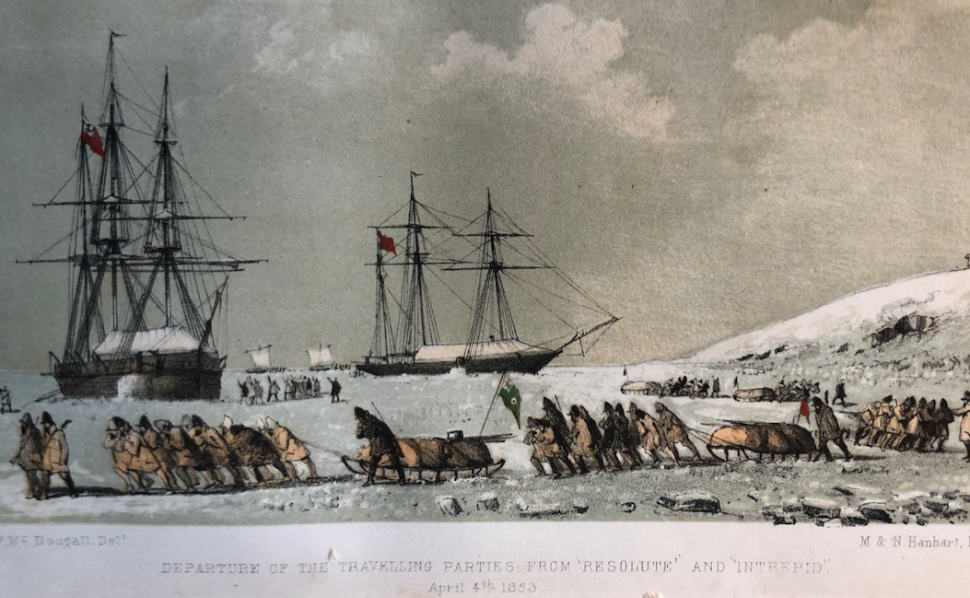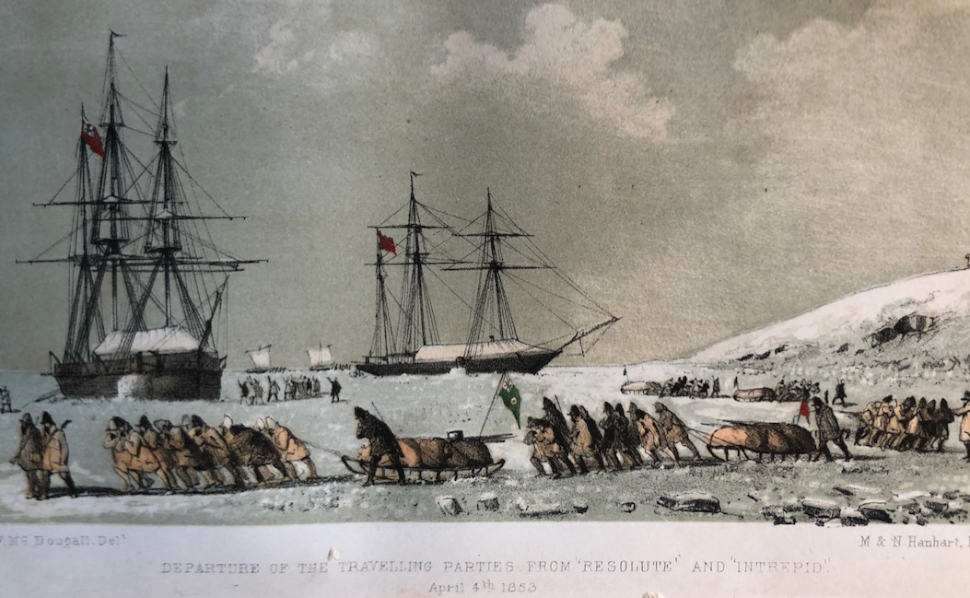After Kellett sent his report to Belcher the Resolutes and Intrepids had to wait for the sledging party’s return.
(From my manuscript)
During this time the officers organised races and wrestling matches. Kellett, with McClintock on his back, raced Pim and, rather suspiciously, won easily. Richard Roche described the festivities in his journal:
8 Aug 53 All hands from both ships went on shore…where a race course had been measured off. Various matches were made, the men running for sweepstakes of 1, 2, and 3 pounds sterling. Several (both officers and men) stripped and ran in drawers and stockings so eager were they for the winning. The Captain ran 50 yards, carrying Captain McClintock on his back, while Pim ran 100 yards in 14 seconds and 300 yards in 46 seconds. Most of the officers ran 150 yards for sweepstakes and Nares (being a long legged young fellow) carried off the first prize. We returned on board by 2 o’clock, the Captain, in a fit of generosity, and in consideration of the fatigue we had undergone, served out a pint of beer all round. I realised 1 pound 10 shillings by the above transactions.
In mid August the ice broke up and Kellett prepared the ships for sailing. With anticipation of an open run, everyone’s spirits filled with soaring joy but, just as the sails were set, the winds shifted and the floe ice solidly blocked the channel ahead of them from Melville Island to the northernmost tip of Byam Martin. The men pretended a philosophical indifference to this turn of events, but most couldn’t hide their disappointment. These fits and starts continued to plague them as they kept trying to make headway towards Beechey Island. But by the beginning of September they began doubting they could reach their goal. Kellett shifted supplies between the ships in case he’s have to order them to separate. He planned to send Intrepid ahead alone if it looked like Resolute wouldn’t get through.
The lookout in Resolute’s crows nest on 11 September saw nothing but ice in all directions. Kellett’s ships were in danger of having to make winter camp drifting in the pack ice. The only consolation was the pack kept moving slowly eastward. If it didn’t crush them, by spring they should be closer to Beechey Island. The pressure of the ice all around caused many eerie and startling sounds, putting the men on edge. Though written about the Antarctic, the Resolutes and Intrepids would’ve recognised Samuel Taylor Coleridge’s description of ice in The Rime of the Ancient Mariner:
And now there came both mist and snow,
And it grew wondrous cold:
And ice, mast-high, came floating by,
As green as emerald.
And through the drifts of snowy cliffs
Did send a dismal sheen:
Nor shapes of men nor beasts we ken-
The ice was in-between.
The ice was here, the ice was there,
The ice was all around:
It cracked and growled, and roared and howled,
Like noises in a swound!
The days passed with a succession of storms while the pack continued to move ESE. Some days they could sail, others a sudden squall would force them to reduce canvas. On 9 September at 01:30 a strong westerly quickly moved the ships along, but in less than an hour a mass of thick, icy sludge stopped Resolute. This time Intrepid towed her out of the nearly impassable ice soup to stable land ice where the men secured both ships.
Kellett sent out hunting parties after spotting a herd of thirty-five muskox. They successfully killed eleven, yielding 1,970 pounds of meat. The day after the hunt Kellett called McClintock and McClure into his cabin to review options. A few hours later, Kellett took the Intrepid aheadto check the state of the ice. Before leaving, Kellett ordered enough supplies brought out of Resolute’s hold to supply seventy men through 1 June 1854 and put them onboard Intrepid. McDougall interpreted this order to mean Kellett would leave Resolute behind if it looked like only the steamship Intrepid could get through.
Later that afternoon McDougall received the signal that he should sail Resolute east to join Intrepid. Only a few minutes after reaching the steam tendera slurry of young ice stopped them again. This time Resolute didn’t budge. They lit Bickford’s fuses, Resolute didn’t budge. They rigged hawsers from both her sides sides to pull and rock her. Resolute didn’t budge. Kellett ordered lines to Intrepid. Resolute made an modicum of progress. But around midnight the ice formed up and stopped our gallant ships.
By 20 September Kellett accepted they had to prepare winter camp on the floe ice. They stowed the topgallant yards and furl the jibs and trysails. As other camp prep took place, some Resolute’s were taken completely by surprise, only a short time after being beset, to find the ice was already 20 feet deep.
Wintering in the pack was dangerous: its instability and movement put the ships at great risk of being crushed. if the floe headed southward and they had to abandon ship, they’d have a much longer trek to North Star. Kellett faced a claustrophobic winter with Resolute and Intrepid so overcrowded. Without secure surrounding land, he couldn’t off load supplies, leaving the deck cluttered with equipment.
Space was so cramped that McClure and Kellett, sharing a tiny cabin, found that one man had to stay in bed while the other washed and dressed; there wasn’t room for two to stand upright. And when the steward came to tidy the room, both [Kellett and McClure] had to go out onto the cold deck…
26 April 2021 blog post:
[From my manuscript: as always italicised print indicates material quoted in the ms]
The Resolutes and Intrepids had initially greeted the Investigators with enthusiasm, and the Investigators, on their part, returned this with their own heartfelt gratitude. Investigator’s translator Johann Miertsching, a Moravian Brothers missionary who could speak Inuit, recorded their initial reception:
I was conducted to the Captain’s cabin, where for the first time in sixteen days I had a decent wash and put on clothes and linen leant me by Captain Kellett. After breakfasting with the two captains [Kellett and McClure], and drinking my first cup of coffee in two and a half years, I went to rest and enjoyed a refreshing sleep until 2 o’clock when I was called for lunch. The ship Intrepid- two hundred paces from the Resolute- has been set up as a hospital for the sick, and twenty two men of our company placed there immediately.
(McClure had told Miertsching to leave his journals behind, but on Resolute he wrote a new one using paper, pens, and ink Kellett, Domville, and DeBray gave him.)
Space was seriously short on both ships:
As for comfortable quarters on board, they lie beyond our sphere of knowledge…On the Intrepid our lot…[is bad] for we have neither the necessary bedding nor warm cabins. Our beds consist of two woollen blankets (coverlets) , one of which each man brought in his sleeping-bag from the Investigator, and the other issued to us here; more cannot be given us for there is no more to give; and our cabins, framed of canvas instead of plank, are so cold that the temperature never rises above freezing point.
Nerves had started fraying before the ice formed up around the ships; then Kellett had to initiate reduced rations. The Investigator’s carpenter George Ford had already begun complaining before summer ended:
We have no place to sit down or wash and but for [Resolute’s carpenter] Mr. Dean’s kindness no place to get our food. All that we have to sleep on is a blanket and buffalo robe we brought with us in a haversack. The men have been doing all the most servile work while this ship’s company does nearly nothing, and part of them officers’ servants. We have never received the least extra to renew our strength, noting but barely the ship’s allowance whilst the traveling parties of this ship on returning got preserved milk, Normandy pippens (sic).
Every Resolute and Intrepid had donated portions of their rations and any extra blankets, but felt their sacrifices weren’t appreciated. When the Investigators excluded them from their celebration it added insult to injury. Miertsching recorded the unpleasant mood in both ships, claiming his shipmates’d been nothing but amiable. But their actions spoke louder than his words as the Investigators followed their captain’s lead in showing no gratitude.
Resolute had a serious condensation problem this winter, probably due to the extra men. Kellett lit all the stoves before building the snowbanks around her to try drying her out as much as possible. It didn’t really help. During October the men alternated between winterising jobs and playing games like rounders on the ice. By the end of the month they’d built a snow depot alongside Resolute, cleared most of the main deck and had secured the tent over it.
The Resolutes, Intrepids, and Investigators welcomed in November by celebrating Guy Fawkes Day. As morning dawned on 5 November masked, blacked-up and disguised Resolutes played music and drew a sledge with their Guy on it to Intrepid, where their stuffed Guy waited upon her deck. They sang, delivered an address to McClintock, played more music then returned to Resolute. An hour later the Intrepids did the same. As night fell Kellett lit an enormous bonfire and the men threw both ships’ gunpowder-filled Guys onto it. The Arctic resounded to explosions, fired rockets and loud huzzahs. Kellett served up double rum rations to close the festivities. Although the Investigators had been included, Ford wasn’t happy: his only words about the celebrations were complaints about the Investigators still being subjected to punishment for their Northwester Day.

